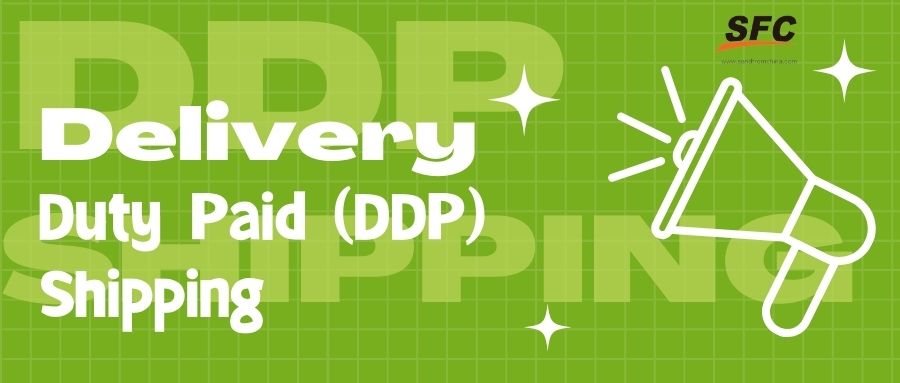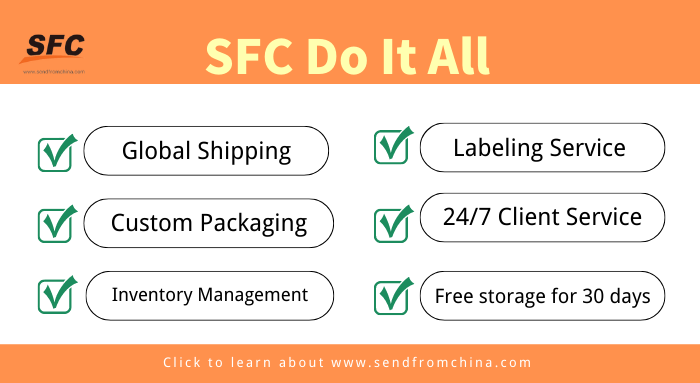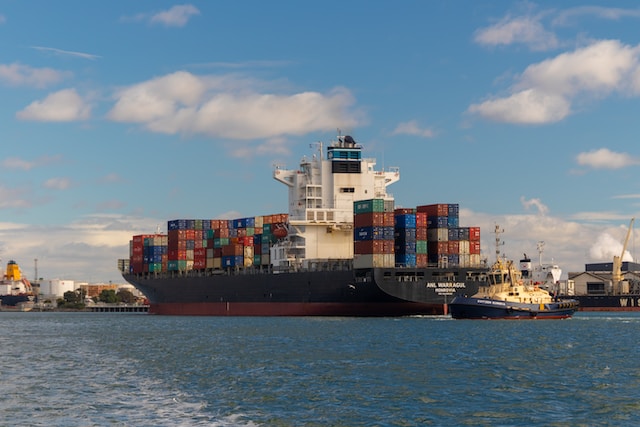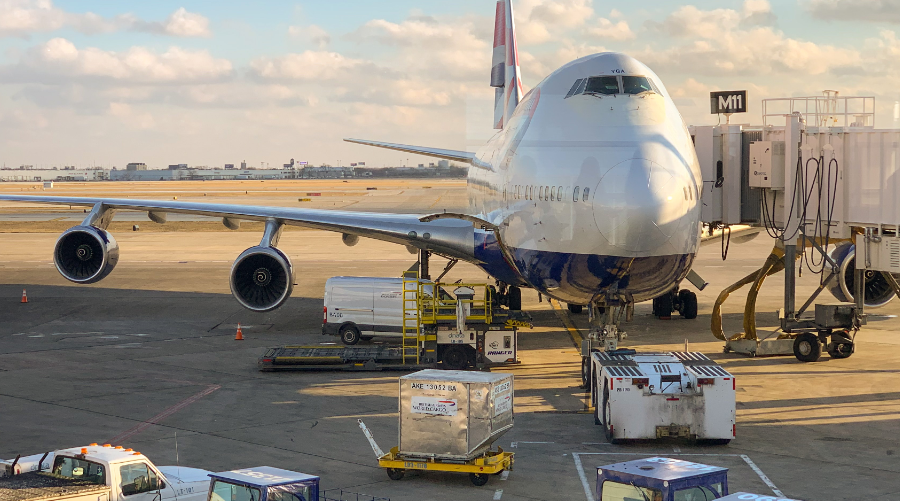Table of Contents
Get Custom eCommerce Fulfillment Service
Book a Meeting
Delivered Duty Paid (DDP) Shipping: Everything You Need To Know
Time: Jul 17,2023 Author: SFC Source: www.sendfromchina.com
Delivered Duty Paid (DDP) shipping is a crucial aspect of international trade, ensuring a smooth and seamless movement of goods across borders. In this comprehensive guide, we will explore the intricacies of DDP shipping, its benefits, key considerations, common challenges, best practices, and how it compares to other incoterms. Whether you're a buyer, online seller, or a logistics professional, understanding DDP shipping is essential for successfully navigating the global marketplace.

I. Introduction
A. Definition of Delivered Duty Paid (DDP) Shipping
At its core, Delivered Duty Paid (DDP) shipping is an incoterm that places the maximum responsibility on the seller. Under DDP terms, the seller takes charge of the entire shipment process, including arranging transportation, paying for freight, handling customs clearance, and delivering the goods to the buyer's specified destination. Importantly, the seller also assumes the risk and cost associated with any potential import duties, taxes, and customs formalities.B. Importance of DDP Shipping for International Trade
DDP shipping plays a vital role in facilitating international trade by providing a seamless and efficient framework for buyers and sellers. It helps eliminate uncertainties and complexities associated with cross-border transactions, ensuring a transparent and predictable process. By clearly defining the responsibilities and costs, DDP shipping minimizes potential disputes and fosters trust between trading partners.II. Benefits of DDP Shipping
A. Convenience for Buyers and Sellers

B. Cost Predictability and Transparency
With DDP shipping, all costs, including transportation, customs duties, taxes, and insurance, are accounted for by the seller or 3PL partners. This ensures cost predictability and transparency for the buyer, as they know the total expenses upfront. It also eliminates surprises or unexpected fees upon arrival, allowing buyers to plan their budget accordingly.C. Reduced Administrative Burden
By taking responsibility for customs clearance and documentation, the seller or the 3PL partner significantly reduces the administrative burden on the buyer. The seller's expertise in navigating complex customs regulations and completing required paperwork ensures a smoother process, saving the buyer valuable time and resources.D. Minimized Risk for Buyers and Sellers
DDP shipping minimizes the risk for both buyers and sellers. 3PL partners take on the responsibility of ensuring the goods reach the buyer's destination safely and in compliance with all regulations. In case of any damage, loss, or customs-related issues, the fulfillment partner is accountable. This reduces the risk for the seller, as buyers can trust that the seller will handle any potential problems that may arise during transit or customs clearance.III. Understanding DDP Shipping Incoterms
A. Explanation of Incoterms

Incoterms, short for International Commercial Terms, are standardized rules defined by the International Chamber of Commerce (ICC). They outline the responsibilities, costs, and risks associated with the transportation and delivery of goods in international trade. Incoterms provide a common language and framework for buyers and sellers, ensuring clarity and consistency in contractual agreements.
B. Overview of Different Incoterms
Incoterms are classified into different categories based on the level of responsibility and risk assigned to the buyer and seller. Some of the commonly used incoterms include Ex Works (EXW), Free Carrier (FCA), Cost and Freight (CFR), Cost, Insurance, and Freight (CIF), Delivered at Place (DAP), and Delivered Duty Paid (DDP).C. Detailed Explanation of DDP Incoterms
DDP is one of the most comprehensive incoterms, placing maximum responsibility on the seller. Under DDP terms, the seller is responsible for arranging and paying for transportation, handling customs procedures, and delivering the goods to the buyer's designated place of destination. The seller is also responsible for import duties, taxes, and any other costs incurred until the goods are delivered.D. Key Responsibilities of Buyers and Sellers
In DDP shipping, the key responsibilities of buyers and sellers are clearly defined. The seller is responsible for export clearance, freight forwarding, customs documentation, import clearance, and delivery to the buyer's location. The buyer, on the other hand, is responsible for providing accurate information, paying for the goods, and ensuring a smooth process at the destination.IV. Key Considerations for DDP Shipping

A. Customs Compliance and Documentation
When engaging in DDP shipping, compliance with customs regulations is crucial. Sellers must stay updated with the import requirements and documentation needed for each destination country. Accurate and complete documentation, including commercial invoices, packing lists, and certificates of origin, is essential to avoid delays or potential penalties.B. Applicable Taxes and Duties
As the seller assumes responsibility for import duties and taxes in DDP shipping, it is vital to understand the tax regulations of the buyer's destination country. Sellers must accurately calculate and include any applicable taxes and duties in the total cost of the goods to avoid unexpected expenses or customs issues.C. Insurance Coverage
While DDP shipping includes responsibility for insurance coverage during transit, it is crucial for sellers and buyers to understand the extent of coverage provided. Additional insurance may be necessary to safeguard the goods against loss, damage, or theft during transportation.D. Delivery and Transportation Logistics
Efficient delivery and transportation logistics are essential for successful DDP shipping. Sellers should work closely with reliable freight forwarders and transportation providers to ensure timely delivery and optimize supply chain processes. Accurate tracking and communication systems help keep all parties informed throughout the shipment's journey.V.Common Challenges with DDP Shipping
A. Language and Cultural Barriers

B. Complex Customs Regulations
Different countries have varying customs regulations, making it challenging to navigate through the import and export procedures. Sellers engaged in DDP shipping must invest time in understanding the customs requirements of different countries to ensure compliance and prevent delays or penalties.C. Potential Delays and Disruptions
Various factors, such as weather conditions, political unrest, or labor strikes, can lead to delays or disruptions in DDP shipments. Sellers should have contingency plans in place to mitigate such risks and maintain open lines of communication with buyers to manage expectations and address any unforeseen challenges.D. Disputes and Liability Issues
Disputes and liability issues can arise in DDP shipping, especially when it comes to damaged or lost goods, customs valuation discrepancies, or regulatory non-compliance. Establishing clear contractual terms, documenting agreements, and having appropriate insurance coverage can help mitigate the risk of disputes and liability issues.VI. Best Practices for DDP Shipping

A. Conducting Thorough Due Diligence
Before engaging in DDP shipping, thorough due diligence is essential. This includes researching the import regulations and requirements of the buyer's destination country, understanding customs procedures, and identifying any potential risks or challenges specific to that market.B. Collaborating with Experienced Freight Forwarders
Working with experienced freight forwarders specializing in international shipping can significantly simplify the DDP process. Freight forwarders have extensive knowledge of customs regulations, documentation requirements, and transportation logistics, making them invaluable partners for successful DDP shipping.C. Implementing Effective Communication Channels
Establishing efficient communication channels with buyers, freight forwarders, customs officials, and other stakeholders is crucial for seamless DDP shipping. Regular updates, timely responses to inquiries, and proactive communication help build trust and ensure that all parties are on the same page throughout the shipping process.D. Maintaining Accurate Record-Keeping
Accurate record-keeping is essential in DDP shipping to demonstrate compliance with customs regulations and fulfill reporting requirements. Sellers should maintain detailed records of shipments, including invoices, packing lists, customs documentation, and any communication related to the transaction.VII. DDP Shipping vs. Other Incoterms

A. Comparison with Delivered at Place (DAP)
DDP and Delivered at Place (DAP) are often confused, but they have significant differences. While DDP terms require the seller to handle import duties and taxes, DAP terms do not, as well as DDU ( Delivery Duty Unpaid). Under DAP, the buyer is responsible for these additional costs, making DDP a more comprehensive and convenient option for buyers.B. Comparison with Cost, Insurance, and Freight (CIF)
Cost, Insurance, and Freight (CIF) is another widely used incoterm. CIF terms include insurance coverage during transit, unlike DDP, where the seller assumes responsibility for insurance only. Additionally, CIF terms do not require the seller to handle import customs clearance, making DDP more suitable for buyers seeking a more streamlined shipping process.C. Considerations for Choosing the Appropriate Incoterm
When selecting the appropriate incoterm, various factors should be considered, including the buyer's location, their familiarity with customs procedures, the value and nature of the goods, and the desired level of control and responsibility. DDP shipping is particularly suitable when buyers seek a hassle-free process and prefer the seller to handle all logistics and customs formalities.VIII. Conclusion
Delivered Duty Paid (DDP) shipping is an invaluable incoterm that simplifies the international trade process for buyers and sellers. By placing maximum responsibility on the seller, DDP shipping ensures convenience, cost predictability, reduced administrative burden, and minimized risk for all parties involved. Understanding the intricacies of DDP shipping, including key considerations, challenges, and best practices, is crucial for successfully navigating the global marketplace.FAQs
1. What are the main advantages of DDP shipping?
DDP shipping offers convenience for buyers and sellers, cost predictability, reduced administrative burden, and minimized risk.2. What are the key responsibilities of buyers and sellers in DDP shipping?
In DDP shipping, the seller is responsible for transportation, customs clearance, and delivery, while the buyer is responsible for accurate information and payment.3. How does DDP shipping compare to other incoterms?
DDP shipping places maximum responsibility on the seller, while other incoterms like DAP and CIF have different levels of responsibility and cost allocation.4. How can I ensure successful DDP shipping?
Thorough due diligence, collaboration with experienced freight forwarders, effective communication, and accurate record-keeping are key to successful DDP shipping. Post Views:25980
Post Views:25980
Copyright statement: The copyright of this article belongs to the original author. Please indicate the source for reprinting.
Previous Post
What Is FIFO: A Comprehensive Guide
Next Post
TAGS
Hot Research
Get Custom eCommerce Fulfillment Service
Book a Meeting
Get a Custom China Fulfillment Solution with FREE Storage for 30 Days
 Want to know about our services, fees or receive a custom quote?
Want to know about our services, fees or receive a custom quote?
 Please fill out the form on the right and we will get back to you within a business day.
Please fill out the form on the right and we will get back to you within a business day.
 The more information you provide, the better our initial response
will be.
The more information you provide, the better our initial response
will be.






 TAGS:
TAGS: